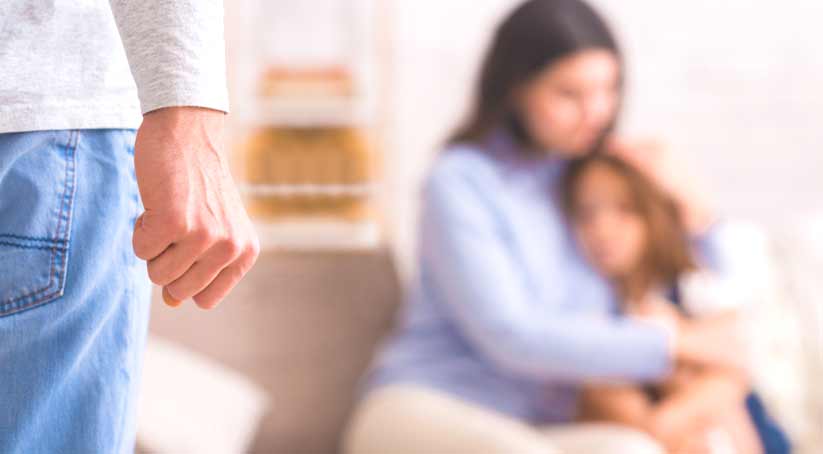Evidence from Domestic Abuse charities, indicate that the Coronavirus lockdown has led to an increase in incidents of domestic abuse, as victims isolated at home with their perpetrators, are not able to readily access their usual means of support.
How has the Covid-19 pandemic affected the incidence of domestic abuse?
Domestic abuse is an all too common crime, social distancing and lockdown measures have had a disturbing impact on domestic abuse figures.
A domestic abuse report in The Guardian newspaper shows that the number of women and children who have been murdered by partners/ex-partners or fathers has more than doubled in the past few weeks since the lockdown began. In addition, domestic violence helplines have reported an increase of 25% in the number of calls they are receiving.
These figures suggest that many women will need assistance in order to keep themselves and their families safe.
How to report domestic abuse
At Paul Crowley & Co solicitors, our highly experienced and dedicated family law department can provide help and advice on your legal rights and options, giving you the information you need to make the decisions which are right for you.
Paul Crowley & Co’s family law department are operating as normal, family law expert, Rachel Gregory is available to take your calls on 0151 264 7363. For some victims making a telephone call is easier said than done, if emailing is safer and preferable to calling, you can email Rachel direct at rachel.gregory@paulcrowley.co.uk
‘Sadly Domestic Abuse is continuing to increase during the ongoing crisis. If you or someone you know is in an unsafe situation, do not hesitate to contact us. We can obtain a Protective Court Order within 24 hours. Please remember you are not alone, there are support services ready and waiting to help.’
Edwina Harkin | Head of Family Law
Paul Crowley & Co, Solicitors
Are the Family courts open?
Yes they are, the Family Courts remain open and Court Orders such as Non Molestation Orders and Occupation Orders are being treated in the highest priority groups. This means that even as the restrictions are in place to prevent the spread of Coronavirus, victims of domestic abuse are still able to access the Courts and the Orders which they need to safeguard them and any children they may have.

Can I qualify for Legal Aid?
Depending on your circumstances Legal Aid is available, to find out if you are eligible to qualify please call Rachel (Gregory) on 0151 264 7363 and Rachel will be happy to assist.
The legal aid evidential requirements for Non Molestation Orders and Occupation Orders have been relaxed. The application process with the Court is largely similar to that which is followed when there are no restrictions in place.
What help is available?
If you are in immediate danger, you should contact the emergency services on 999, the police will continue to respond to emergency calls.
As well as contacting Paul Crowley & Co solicitors for legal advice, there are a number of domestic abuse / violence helplines and charities who are available to offer help and assistance.
These include:
Merseyside Domestic Violence Services call in confidence : 0778 094 8890
The National Domestic Abuse Helpline 24-Hour Helpline Freephone : 0808 2000 247
further support for victims of domestic abuse can be found via the governments website Gov.uk.
Can I leave home during the lockdown?
Yes you can. It is important to remember that, despite the lockdown restrictions, it is legal to leave home to seek safety elsewhere if you (or your children) are at risk of domestic abuse.
Victims of domestic abuse should be aware that Government regulations as set out in S 6 of the Health Protection (Coronavirus, Restrictions) (England) Regulations 2020, Section 6 (2) (m) makes it clear that it is acceptable for any person who finds themselves in a situation where they are at risk of domestic abuse, then they should leave their home in order to escape from the situation.
What is domestic abuse?
Many people believe that domestic abuse relates only to physical violence, the reality is that there are a number of behaviours which fall under the umbrella of domestic abuse.
It can include, but is not limited to:
- Coercive control and ‘gaslighting’
- Verbal abuse
- Financial abuse (having money withheld, stolen or denied access to your own money)
- Online abuse
- Emotional abuse (passive aggressive behaviour, being ignored, being shouted at)
- Sexual abuse (including rape within the context of a relationship)
How common is domestic violence?
Recent figures from charity Women’s Aid indicate that in 2018, 7.9% of women and a smaller percentage of men were victims of domestic violence. Given that many domestic violence victims don’t report the abuse they’ve been subjected to, it’s likely that the true figures are far higher.
Domestic violence can result in serious injury to victims, including death. Figures suggest that, on average, two women a week are murdered by a partner or ex-partner. In comparison, around 30 men each year are murdered by a partner or ex-partner.
Domestic violence accounts for (on average) 16% of all violent crime and the police in England and Wales receive about 100 calls an hour relating to domestic violence. What these figures tell us is that domestic violence is a form of abuse which normally affects significant numbers of individuals, particularly women.
There is no excuse for domestic abuse
You are not alone do not suffer in silence, when you are ready to talk the family law department at Paul Crowley & Co are ready to listen.
Follow us on social media
Keep up-to-date with Paul Crowley & Co by following us on social media! Tweet us or message us on Facebook:


 ‘Sadly Domestic Abuse is continuing to increase during the ongoing crisis. If you or someone you know is in an unsafe situation, do not hesitate to contact us. We can obtain a Protective Court Order within 24 hours. Please remember you are not alone, there are support services ready and waiting to help.’
‘Sadly Domestic Abuse is continuing to increase during the ongoing crisis. If you or someone you know is in an unsafe situation, do not hesitate to contact us. We can obtain a Protective Court Order within 24 hours. Please remember you are not alone, there are support services ready and waiting to help.’ Edwina Harkin | Head of Family Law
Edwina Harkin | Head of Family Law